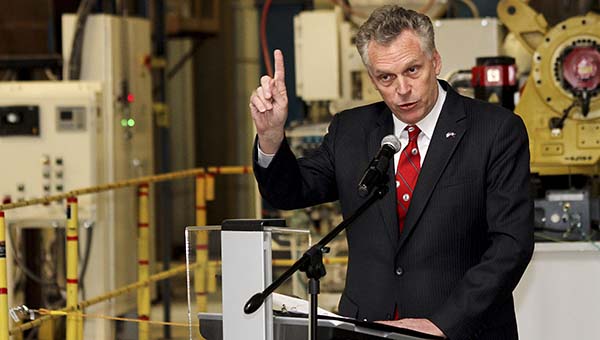Soy subsidy stirs ‘Frankenfood’ debate in VA

HELPING HAND: Gov. Terry McAuliffe talks up agricultural exports at Montague Farms in Windsor.
By Kenric Ward | Watchdog.org Virginia Bureau
WINDSOR, Va. — The state of Virginia is helping an agricultural giant sell non-genetically modified soybeans to South Korea — while reaping little value at home.
Gov. Terry McAuliffe this week announced $14,100 in matching funds to “enable Montague Farms to enter a new market, increasing and diversifying its opportunities for selling these value-added soybeans abroad.” Another $14,100 is provided by Isle of Wight County, home of a Montague processing facility.
Montague has exported non-genetically modified organism (GMO) soybeans for more than 25 years. Heretofore, the privately owned firm focused on the Japanese market, “widely recognized for its demanding quality standards,” according to McAuliffe’s office.
Though Montague is netting a relatively small share of public dollars, critics say the export subsidy does even less for food security or quality stateside.
“The real shame is that they are making more money selling non-GMO to the Asian market,” said Lois Smith, president of the Virginia Independent Consumers and Farmers Association.
“Ninety percent of soybeans in America are GMO’d. Now we are granting money to grow non-GMO for other countries,” Smith told Watchdog.org in an interview.
While neither Virginia nor the nation requires GMO labeling, Timothy Wise of Tufts University says it’s ironic the state is subsidizing GMO-free efforts overseas.
“The state’s largest soy exporter probably does not need small public financing … but small farmers trying to supply certifiably non-GMO soy could probably use support to participate in a certifiably non-GMO value chain, and not just for export,” said Wise, director of the Research and Policy Program at Tufts’ Global Development and Environment Institute.
GMO crops continue to spur vigorous scientific and political debate over chemically engineered “Frankenfood.” The World Health Organization acknowledges concern over “an undesirable level of control of seed markets by a few chemical companies.”
“Bottom line: We are giving grant money to farms to grow non-GMO for poorer countries,” Smith said.
Montague executive Tom Talliaferro said in a statement:
“Exports are what drives our business, so we are glad to have this assistance from the commonwealth of Virginia that enables us to continue to develop these markets.”
The company said it has invested $600,000 on a new packaging system, a testing laboratory and warehouse.
Yet the payoff is peanuts for Virginians. McAuliffe’s office acknowledged that only three jobs will be added at Montague’s Windsor facility as a result of the state subsidy.
Steve Stanek, research fellow for budget and tax policy at the free-market oriented Heartland Institute, said:
“The federal government since the 1930s has made agriculture one of the nation’s most heavily subsidized and trade-protected industries, and now Governor McAuliffe has decided Virginia should add more weight to the nation’s government-backed agricultural bloat.”
Montague received its grant through the state’s two-year-old Agriculture and Forestry Investment Fund. It was the first disbursement under the McAuliffe administration.
Officials at Montague and McAuliffe’s office did not respond to interview requests.
Kenric Ward is chief of Watchdog.org’s Virginia Bureau. Contact him at kenric@watchdogvirginia.org or at (571) 319-9824. @Kenricward
The post Soy subsidy stirs ‘Frankenfood’ debate in VA appeared first on Watchdog.org.







